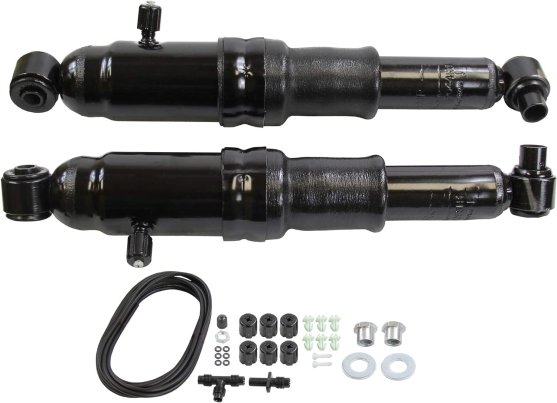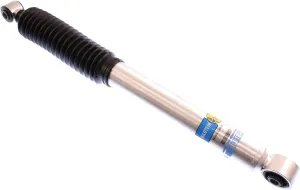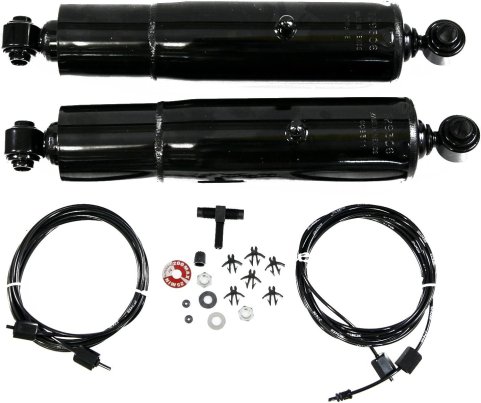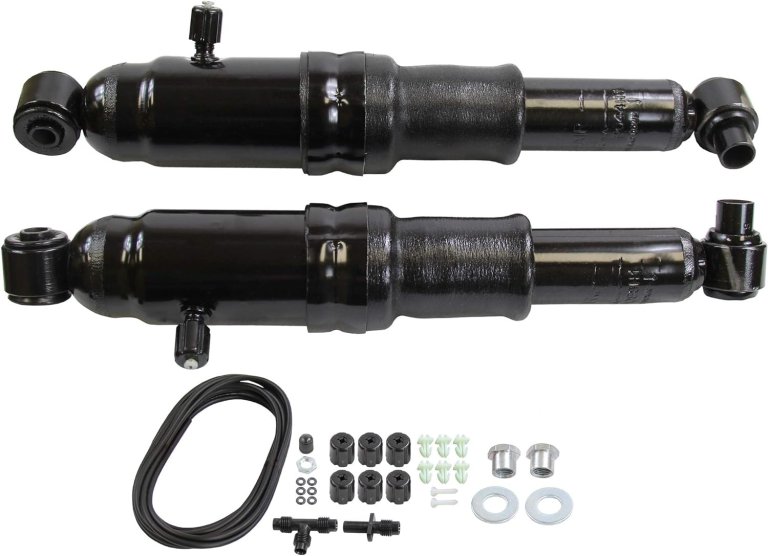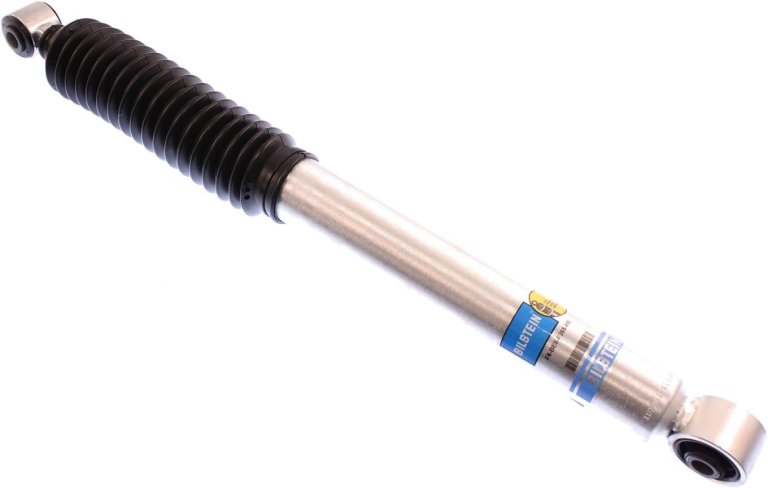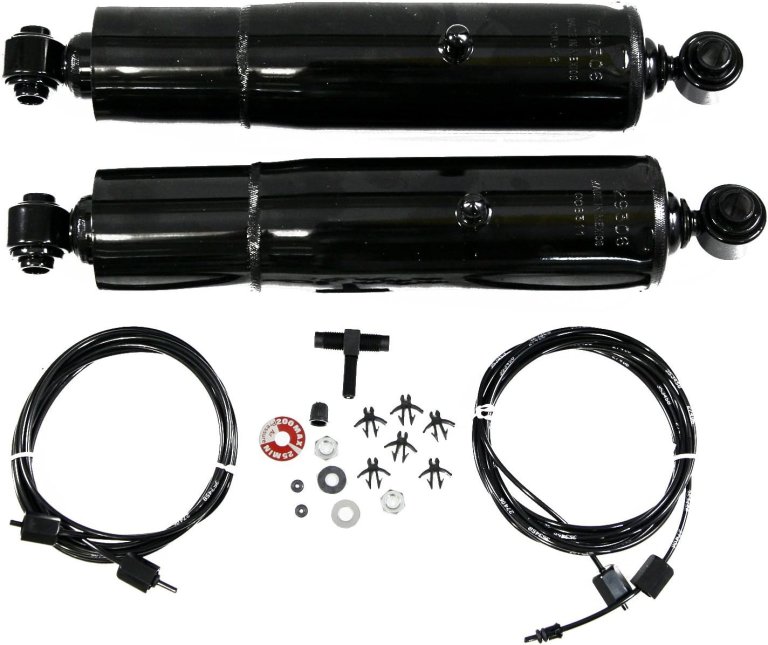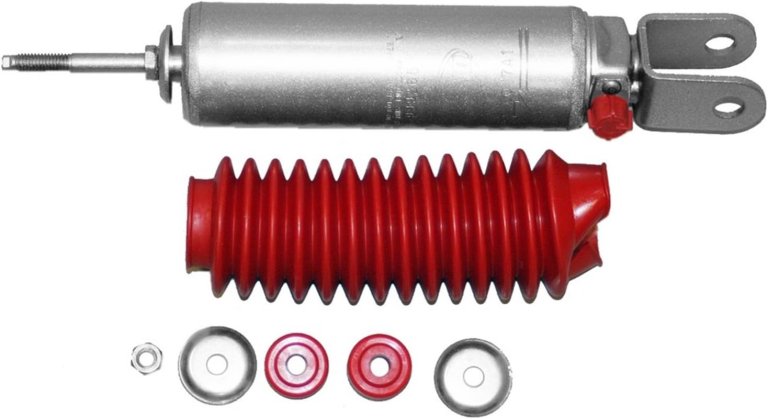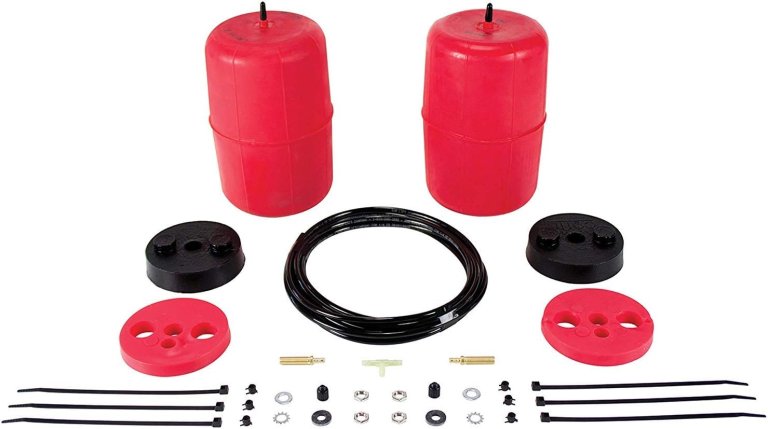We may earn revenue from the products available on this page and participate in affiliate programs. Learn more ›

Squat under load doesn’t just look uncool, it can also pose a safety hazard by unloading the front tires and reducing your ability to stop and steer. Take it from me, not being able to properly stop or steer several tons of rig and trailer down the highway in inclement weather will really make you wish your rig had a brown interior.
Thankfully, a variety of solutions exist to combat squat and shocks are some of the simplest. From upgraded traditional dampers to the sheer power of air, we’ve combed the market for products that’ll help ensure your future towing endeavors go off without a hitch. Without further ado, here are our top picks for the best shocks for towing.
Summary List
- Best Overall: Monroe Max-Air
- Best Value: Bilstein B8 5100
- Honorable Mention: Gabriel Hi-Jackers
- Best Adjustable: Rancho 9000XL
- Best That Aren’t Shocks: Air Lift 1000
Our Methodology
When we sat down to make our top picks, we prioritized shocks capable of leveling loads as minimal squat is generally desired when towing. For leveling shocks, we looked at leveling capacity, required pressure, and ease of leveling. For conventional dampers, we took construction and damping into account, prioritizing dampers with durable monotube construction. We also used a 2004 Chevrolet Tahoe LT 4WD as our pricing control vehicle as it’s a fairly typical tow rig with coil-spring rear suspension prone to squatting when loaded.
Price remained a key priority as we believe that the safety of towing-optimized shock absorbers should be available to everyone. As ever, we followed our Guides & Gear code of ethics to ensure freedom from undue influences and used a mixture of personal experience, manufacturing standards, and real-world Amazon user reviews to help select our top picks. In the end, we were able to crown some winners and recommend solutions for everyone, regardless of use case.
Best Shocks for Towing Reviews & Recommendations
Best Overall: Monroe Max-Air
Pros
- Massive 1,200 pounds of load-leveling capability
- Compatible with onboard factory air compressors
- Affordable
Cons
- Only a two-year warranty
- Some portable 12-volt pumps will struggle to reach 150 PSI
Air shocks are a certified towing classic. They’re durable, easy to install, relatively inexpensive, and do a phenomenal job of leveling loads. When it comes to air shocks, Monroe is a trusted name with decades of experience and widespread availability across local auto parts stores and the internet.
The beauty of these Max-Air air shocks is that they can be adjusted manually or be integrated to work with a factory compressor system. Pump it up like Joe Budden all the way to 150 PSI for 1,200 lbs. of load-leveling capability or air down for a super comfy ride. Granted, most portable 12-volt air compressors will struggle to put out 150 PSI but gas station air pumps are plentiful enough to make things work.
Downsides? Well, aside from the quarters you’ll use pumping up the dampers, the Max-Airs aren’t covered by Monroe’s limited lifetime warranty. However, their two-year standard warranty is quite fair for the air shock market, and overall pricing lands on the right side of $100. That’s a lot of capability for fairly little outlay
Best Value: Bilstein B8 5100
Pros
- Seriously strong construction
- Fantastic limited lifetime warranty
- Built under Bilstein’s incredibly high-quality control standards
Cons
- Expensive for a non-leveling shock
- Digressive damping usually requires an adjustment period
Bilstein is a name often spoken of with deep respect. An OEM supplier and aftermarket legend, Bilstein’s shock absorbers have found their way under everything from trophy trucks to BMWs, indicative of a product range as varied as it is excellent. For those on towing duty, there’s the B8 5100. Maybe not our conventional type of pick for the award of Best Value, but it’s hard to deny that your money goes the furthest with Bilstein.
A solid upgrade over OEM dampers, the B8 5100 features a beefy 46-millimeter rod and an inverted monotube design. Why inverted? Put simply, inverted monotube shock absorbers feature better ride quality, stronger construction, and greater oil capacity for enhanced overall stability. It’s a tried and true design that Bilstein is proudly sticking with. In addition, the B8 5100 features digressive valving for a firm and controlled ride over small bumps but plenty of absorption over large potholes and really rough terrain. Great for smoothing out the motions of a tow vehicle yet still maintaining great control.
While the Bilstein B8 5100 certainly isn’t the most affordable damper on the market, those willing to pay a premium will reap the rewards. Just keep in mind that it isn’t a self-leveling or adjustable pressure damper, so it’s not the best option for ultra-heavy loads.
Honorable Mention: Gabriel Hi-Jackers
Pros
- An impressive 1,100 pounds of load-leveling capacity
- Tons of applications available
- A trusted name for more than 50 years
Cons
- On the pricier side of the air shock market
- Even many gas station pumps will have a hard time hitting 200 PSI
While the name is a bit questionable, Gabriel Hi-Jackers are a trusted, long-running option for air shocks. Since 1967, they’ve been a reputable option for those looking to level out their tow vehicle and have found their way under everything from pickup trucks to modified muscle cars
Some competitors can boast higher maximum leveling capabilities, the Hi-Jackers can level out a still substantial 1,100 pounds of load. Moreover, they can withstand up to 200 PSI of air pressure which is an impressive sign of their build quality
However, the Hi-Jackers do come with a few downsides. For starters, the air hose kit for pumping them up is considered to be sold separately, pushing total cost of parts over the $100 mark. Then there’s the fact that many gas station air pumps will struggle to push out a full 200 PSI of air pressure, and getting that figure out of a portable 12-volt compressor? Forget about it.
Best Adjustable: Rancho 9000XL
Pros
- Adjustable damping that can be stiffened up for towing support
- Good Value
- Available for both stock and lifted applications
Cons
- Adjusters require some attention so that they remain adjustable
- Crawling under your rig to adjust damping is a bit hard on your back
All right, so maybe you’re not always near a powerful enough compressor to run air shocks but you want more capability than a fixed-rate damper. No worries — off-road legends Rancho are racing to the rescue with their 9000XL adjustable shocks.
Adjustable? Indeed. By simply twirling a knob, the 9000XLs can be fine-tuned for a stiffer or softer ride. Turn the knob to the right for additional control when towing, turn the knob to the left for a like-factory ride when not towing or hauling. It’s the same sort of tech you see in coilovers, only now in a truck application. Throw in an interesting tri-tube construction and integrated rebound bumpers, and the 9000XL packs a lot of effective tech into a relatively mainstream package
As Rancho focuses primarily on aftermarket applications, the range of fit of the 9000XL is absolutely enormous. Quarter-ton, half-ton, and three-quarter-ton trucks, Jeeps, and SUVs, stock or lifted suspension—chances are that there’s a 9000XL made to perfectly fit your rig. Unfortunately, the 9000XL is a bit on the expensive side, although a set will pay its way back the second time around, thanks to Rancho’s limited lifetime warranty.
Best That Aren’t Shocks: Air Lift 1000
Best That Aren’t Shocks
Air Lift 1000
Check Latest PricePros
- Incredibly easy to install
- Doesn’t affect unladen ride quality when aired down
- Max pressure of 35 PSI is easily reached with a cheap 12-volt compressor
Cons
- Doesn’t offer superior road debris resistance
- Longevity may vary based on climate
Sometimes the most effective tool for the job requires thinking out of the box. If you’re towing with a coil-sprung vehicle, you’re likely to experience more sag than if you were towing with leaf springs. While self-leveling dampers have attempted to address this sag for years, why not cut right to the source and increase your effective spring rates?
Air Lift 1000 kits are a bit different from the air suspension on modern custom cars in that they’re manually controlled and don’t replace the springs. Installation does require some finagling but usually doesn’t require breaking out sketchy spring compressors, plus these bags can be aired down to five PSI when not towing for a near-factory ride.
These kits clock in between $100 and $150, only take about 90 minutes to install, don’t require any specialty tools, and feature up to 1,000 lbs. of load-leveling capability. On the minus side, pumping up the bags will make the ride bouncier, you will need to carry a tire inflator to pump up the bags and routing the air lines on low-lying surfaces can make them susceptible to road debris.
Our Verdict
The most effective solution for towing is almost always load-leveling and air shocks make a particularly massive difference in coil-sprung vehicles like SUVs and modern Ram 1500s. The Monroe Max-Air won our best overall pick for its combination of capability and affordability, while the Gabriel Hi-Jacker won our honorable mention thanks to its proven technology and trusted name.
FAQs
You’ve got questions. The Drive has answers!
A. Shocks designed for towing generally involve a sort of leveling design, be it hydraulic or pneumatic. In addition, they often adopt a heavier-duty monotube design over a traditional twin-tube damper. This aids longevity and body control under high load, both of which are beneficial improvements for vehicles used for towing.
A. Even traction and stability are best achieved with even ride height. When a trailer is hooked up to a vehicle, the rear end typically squats, reducing traction on the front tires. Not only do your front wheels steer your vehicle, but your front brakes also provide the majority of stopping power. By leveling your vehicle, you increase control over those front wheels.
A. While air line routing seems fairly simple, there are a few things worth keeping in mind. First, make sure your air lines aren’t attached to anything that moves. Cable-tying air lines to suspension components is a sure recipe for disaster. Second, route them away from the exhaust as melted lines are no fun. Finally, keep them free of super-tight openings near body mounts where they may chafe on the frame, body, or bed. Follow these steps and your air lines should last for years to come.
A. Upgraded non-leveling shocks are great for leaf spring or off-road applications, offering a nice balance between a comfortable ride and higher control in a maintenance-free package. As a bonus, many non-leveling aftermarket shocks offer seriously impressive warranties, a boon for anyone keeping their rig for the long-haul.
